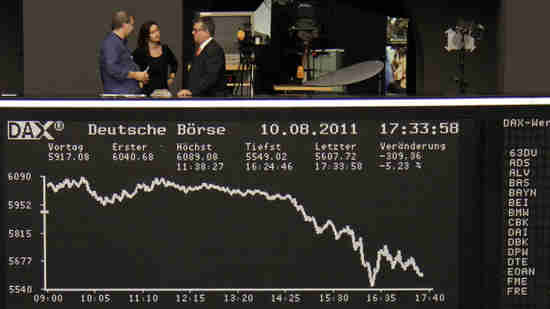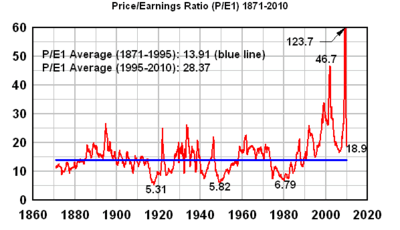
Dynamics

|
Generational Dynamics |
| Forecasting America's Destiny ... and the World's | |
| HOME WEB LOG COUNTRY WIKI COMMENT FORUM DOWNLOADS ABOUT | |
The euro is quickly unraveling
World stock markets give all appearances of being in free fall, as the Dow Jones Industrial Average fell another 519 points, down 4.6% in another roller coaster day, and has now lost more than 2,000 points since July 21, according to AP. From the point of view of Generational Dynamics, this wild lurching is a danger sign that full scale panic may be near.
 |
Based on various comments I heard on TV, here's what I infer has been going on: Analysts have been predicting the fabled "V-shaped" recovery in the last half of this year, and that prediction was based on bloated predictions of corporate earnings in the last half of the year. Starting from these bloated predictions, analysts further screw things up by ignoring one-time expenses (these are the so-called "operating earnings"). The result is that analysts were predicting huge profits this year, which would mean low price/earnings ratios (also called "valuations"), which would mean that stocks are "oversold" and "the cheapest they've been in years."
Since July 21, it's become increasingly clear to the general public that mainstream economists and analysts don't have the vaguest idea what they're talking about, and that politicians simply lie about economics every time they open their mouths. This has caused investors to realize that the bloated earnings predictions are not valid.
If the bloated earnings predictions are wrong, then valuations are much higher than the analysts and economists have been saying, and therefore stocks are overpriced after all. Thus, the reasoning concludes, it's time to sell. And that's what they did.
All it took on Wednesday was a trigger: A rumor that France's debt was going to be downgraded from AAA, immediately denied by all three major ratings agencies. But the rumor was too credible to be ignored, since France is worse off than the U.S., and the U.S. has lost its AAA rating.
The other part of the rumor was that France's major banks -- Société Générale, BNP Parabas, and Crédit Agricole -- were all in serious trouble because of their exposure to Greek debt. Once again, all three issued immediate denials, SocGen particularly saying that it plenty of reserves. But let's recall that in March, 2008, Bear Stearns went bankrupt. (See "A historic day in Ben Bernanke's Great Historic Experiment")
Two days before Bear Stearns collapsed, the CEO Alan Schwartz had appeared on CNBC, responding to rumors that Bear was having a liquidity crisis. At that time, he said:
"We finished the year, and we reported that we had $17 billion of cash sitting at the parent company as a liquidity cushion. As the year has gone on, since year end, that liquidity cushion has been virtually unchanged, ... The markets have certainly gotten worse, but our liquidity position has not changed at all, our balance sheet has not weakened at all,"
It was a complete lie.
So SocGen and the other banks made a similar statement on THIS Wednesday, and there's no reason to believe SocGen's denial.
What we do know is that, at the end of August, SocGen and other European banks are going to be forced to "voluntarily" do a bond swap of their Greek bonds, and that will force them to take a "voluntary" haircut of at least 21%, and possibly a lot more. (See "24-Jul-11 World View -- Mauldin: Greece's bond 'haircuts' are at 75-80%").
So it's not surprising that investors didn't really believe the nonsense denials. The result was that SocGen was down 14.7%, Agricole was down 11.8%, and BNP was down 9.4% -- on Wednesday alone. Italy's Intesa Sanpaolo was off 14%, and Monte dei Paschi fell 10%, according to Financial Times (Access).
Once the European banks led the way, American banks started selling off as well. The reason is that American banks are just as overexposed to European banks, especially French banks, as European banks are overexposed to Greek banks.
 |
I'm posting this chart again because it's still highly relevant, and it explains what's going on on Wall Street. Even if you don't understand the Law of Mean Reversion at all, you can still understand this chart. This shows that P/E ratios (also called "valuations") have been high, sometimes astronomically high, continuously since 1995. And you can see that valuations are on their way down to 1982 levels, which implies a stock market at the Dow 3000 level or lower.
What's becoming increasingly clear, based on the commentary that I heard on Wednesday, is that the euro is quickly unraveling.
Europe has exactly two choices right now:
There is no way that this is going to be anything but ugly. Emotions run deep, and many of these European countries still feel the same hatreds towards each other that they did in WW II, even though those feelings have been masked for decades by the "European Project."
 |
This is the conflict risk graphic that appears on the home page of my web site. I last modified it in February when the "Arab spring" riots began, raising the risk level for "Arab Israeli" to level 3 (red).
I first started posting this graphic in 2005, and I've always put "W. Europe" at level 1 (green), because there seemed to be no chance of conflict within the prescribed 6-12 months. But as the euro continues to unravel, that might change. It will certainly change if there are any major bank failures, as appears to be increasingly likely.
As for what comes next on Wall Street, we can be sure that the turbulence will continue. We've been debating in the Generational Dynamics forum, based on historical analysis, whether it's likely that a full scale panic will come in the next few days, at the end of August, or later. What is certain is that the stock market is very dangerous right now, and should be avoided completely.
Note: At this writing on Wednesday evening, Wall Street stock futures are up by almost 2%, suggesting that Thursday will see a new lurch upward.
(Comments: For reader comments, questions and discussion,
see the 11-Aug-11 News -- Stock panic resumes on concerns over Europe's solvency
thread of the Generational Dynamics forum. Comments may be
posted anonymously.)
(11-Aug-2011)
Permanent Link
Receive daily World View columns by e-mail
Donate to Generational Dynamics via PayPal
Web Log Summary - 2016
Web Log Summary - 2015
Web Log Summary - 2014
Web Log Summary - 2013
Web Log Summary - 2012
Web Log Summary - 2011
Web Log Summary - 2010
Web Log Summary - 2009
Web Log Summary - 2008
Web Log Summary - 2007
Web Log Summary - 2006
Web Log Summary - 2005
Web Log Summary - 2004
Web Log - December, 2016
Web Log - November, 2016
Web Log - October, 2016
Web Log - September, 2016
Web Log - August, 2016
Web Log - July, 2016
Web Log - June, 2016
Web Log - May, 2016
Web Log - April, 2016
Web Log - March, 2016
Web Log - February, 2016
Web Log - January, 2016
Web Log - December, 2015
Web Log - November, 2015
Web Log - October, 2015
Web Log - September, 2015
Web Log - August, 2015
Web Log - July, 2015
Web Log - June, 2015
Web Log - May, 2015
Web Log - April, 2015
Web Log - March, 2015
Web Log - February, 2015
Web Log - January, 2015
Web Log - December, 2014
Web Log - November, 2014
Web Log - October, 2014
Web Log - September, 2014
Web Log - August, 2014
Web Log - July, 2014
Web Log - June, 2014
Web Log - May, 2014
Web Log - April, 2014
Web Log - March, 2014
Web Log - February, 2014
Web Log - January, 2014
Web Log - December, 2013
Web Log - November, 2013
Web Log - October, 2013
Web Log - September, 2013
Web Log - August, 2013
Web Log - July, 2013
Web Log - June, 2013
Web Log - May, 2013
Web Log - April, 2013
Web Log - March, 2013
Web Log - February, 2013
Web Log - January, 2013
Web Log - December, 2012
Web Log - November, 2012
Web Log - October, 2012
Web Log - September, 2012
Web Log - August, 2012
Web Log - July, 2012
Web Log - June, 2012
Web Log - May, 2012
Web Log - April, 2012
Web Log - March, 2012
Web Log - February, 2012
Web Log - January, 2012
Web Log - December, 2011
Web Log - November, 2011
Web Log - October, 2011
Web Log - September, 2011
Web Log - August, 2011
Web Log - July, 2011
Web Log - June, 2011
Web Log - May, 2011
Web Log - April, 2011
Web Log - March, 2011
Web Log - February, 2011
Web Log - January, 2011
Web Log - December, 2010
Web Log - November, 2010
Web Log - October, 2010
Web Log - September, 2010
Web Log - August, 2010
Web Log - July, 2010
Web Log - June, 2010
Web Log - May, 2010
Web Log - April, 2010
Web Log - March, 2010
Web Log - February, 2010
Web Log - January, 2010
Web Log - December, 2009
Web Log - November, 2009
Web Log - October, 2009
Web Log - September, 2009
Web Log - August, 2009
Web Log - July, 2009
Web Log - June, 2009
Web Log - May, 2009
Web Log - April, 2009
Web Log - March, 2009
Web Log - February, 2009
Web Log - January, 2009
Web Log - December, 2008
Web Log - November, 2008
Web Log - October, 2008
Web Log - September, 2008
Web Log - August, 2008
Web Log - July, 2008
Web Log - June, 2008
Web Log - May, 2008
Web Log - April, 2008
Web Log - March, 2008
Web Log - February, 2008
Web Log - January, 2008
Web Log - December, 2007
Web Log - November, 2007
Web Log - October, 2007
Web Log - September, 2007
Web Log - August, 2007
Web Log - July, 2007
Web Log - June, 2007
Web Log - May, 2007
Web Log - April, 2007
Web Log - March, 2007
Web Log - February, 2007
Web Log - January, 2007
Web Log - December, 2006
Web Log - November, 2006
Web Log - October, 2006
Web Log - September, 2006
Web Log - August, 2006
Web Log - July, 2006
Web Log - June, 2006
Web Log - May, 2006
Web Log - April, 2006
Web Log - March, 2006
Web Log - February, 2006
Web Log - January, 2006
Web Log - December, 2005
Web Log - November, 2005
Web Log - October, 2005
Web Log - September, 2005
Web Log - August, 2005
Web Log - July, 2005
Web Log - June, 2005
Web Log - May, 2005
Web Log - April, 2005
Web Log - March, 2005
Web Log - February, 2005
Web Log - January, 2005
Web Log - December, 2004
Web Log - November, 2004
Web Log - October, 2004
Web Log - September, 2004
Web Log - August, 2004
Web Log - July, 2004
Web Log - June, 2004